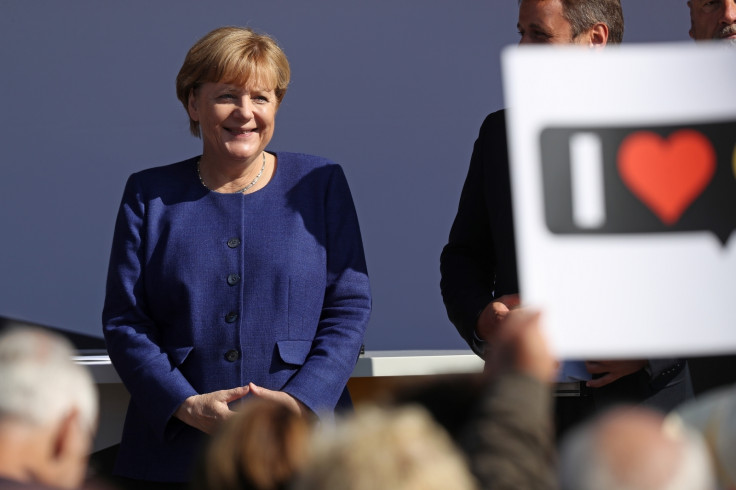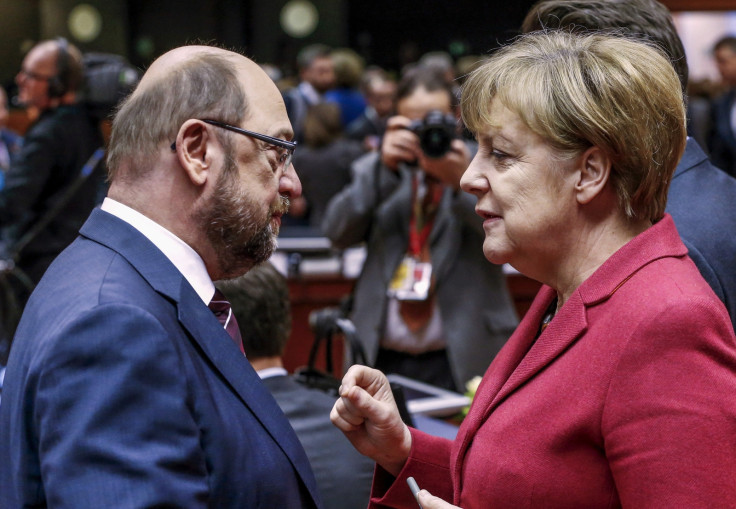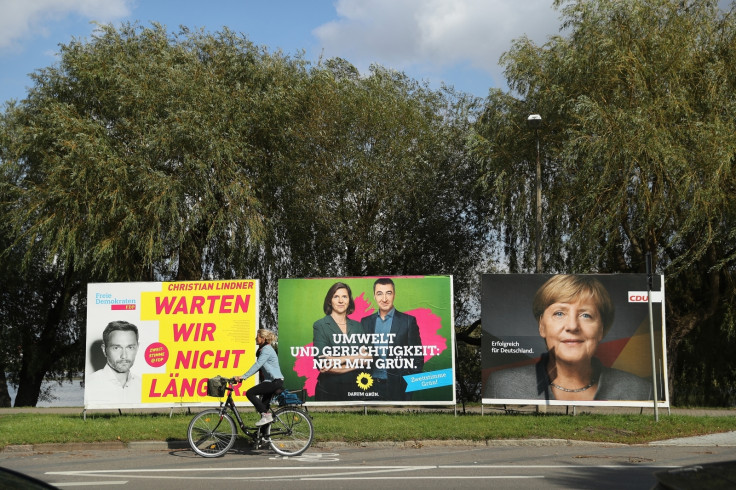Why Germany might go Jamaican after its 2017 election (and what that means)
A so-called 'Jamaica coalition' has never held the balance of power in Germany before.

Barring a scandal or major incident, Angela Merkel looks poised to cruise to a fourth term in office. Germans will be heading to the polls on Sunday (24 September) to decide who they want to govern them for the next four years.
But the German electoral system, which is a complicated mix of first-past-the-post and proportional representation, makes it almost impossible to win an outright majority in the Bundestag (the German parliament).
In fact, only once since the electoral system was reformed after the Second World War has a party managed to get a majority. That was in 1957 when Konrad Adenauer took 50.2% of the vote.
The closest that any party has come to 50% in the past 25 years was Merkel's CDU (Christian Democratic Union) back in 2013 when they won 41.5% of the vote.
This leads to an almost inevitable coalition to secure a majority in the Bundestag, but this is never a simple negotiation. In 2005, when Merkel first came to power, negotiations that led to the formation of a grand coalition between her centre-right CDU and the centre-left SPD (Social Democratic Party), took ten weeks.
This time around there are three main options that face politicians once the dust has settled and Monday morning arrives. The discussions of old alliances and grand coalitions are already on the cards, but a more unusual union involving the Greens could form what is known in Germany as the Jamaica coalition.
This three-way union would be a first for the country, and also the first time that the Greens enter a power-sharing agreement with their conservative rivals.
But what other options will Merkel have?
Grand coalition
Two of Merkel's three terms in power have been part of a grand coalition with her main opposition party the SPD.
Ever since Merkel came to power 12 years ago, the SPD have struggled to get results. Their worst came in 2009 when they only managed 23%, and current polling suggests they may even fall short of that mark. The debate internally is which way to go next? Remain with Merkel, or return to opposition.
A poll by ARD on 14 September showed that 50% of SPD members wanted to remain in government, and 46% wanted to back out of government and begin the groundwork for 2021, when Merkel isn't expected to run again.
The chance of another grand coalition remains high, and it will come down to whether the SPD can stomach another four years alongside Merkel.

Fragmented votes
The centrist FDP (Free Democratic Party) have often formed coalitions with either the SPD or the CDU. However, its recent alliances have been with Merkel's CDU.
In fact, the last time the FDP teamed up with the SPD at a national level was in the 1970s under the chancellorship of Helmut Schmidt.
Between 2009 and 2013, the party were in power with the CDU, but when elections came around, they failed to meet the 5% threshold to enter the Bundestag and for the first time in their history were neither in opposition or power.
"Were the AfD to become the third biggest party in Germany, it would also show a radical shift in German domestic politics"
This time around, the party are poised to return to the German parliament with around 10% of the vote.
But the current average polling figures between the CDU and FDP would only give them between 45-48%- not enough to govern as a majority.
The problem the FDP are facing is that although they are set to take around 10% this time around, the Greens are polling within a percentage point or two, and for the first time ever, a new threat looms from the AfD.
Alternative for Germany, the anti-immigrant party of the country with similar traits to France's National Front and Britain's Ukip, could reach as much as 12%, making them the third-largest party in the Bundestag.
Judy Dempsey, a fellow and editor-in-chief at the think-tank Carnegie Europe said: "Were the AfD to become the third biggest party in Germany, it would also show a radical shift in German domestic politics. A certain consensus about the political status quo, which for decades had been spread between right, centre, and left, would have been broken."
The AfD have almost no hope of entering government. Both the CDU and SPD have ruled out forming any coalition with the AfD, meaning that any seats they do end up taking up, would be in opposition.
With the AfD making inroads, it means a more complicated coalition could be on the cards.

The Jamaica coalition
This option is the one that had attracted the most headlines, partly because it would involve three parties rather than two, and it would also involve the Greens joining forces with the conservative rivals.
Although Germans are accustomed to coalitions, instances involving three or more parties are rare.
The last such occurrence was during the third administration under Helmut Kohl (1987-1991), but this was only because his CDU-FDP coalition was joined by the East German DSU while reunification was taking place.
This time around, if a grand coalition is pushed away and the numbers don't allow a simple CDU-FDP partnership, then the latter may be joined by the Greens to form what is known colloquially as the Jamaica coalition. It is named after the Caribbean nation's flag because of the party colours, black (CDU), yellow (FDP) and green (Greens).
This combination has never been seen before in German politics but should be enough to give Merkel her majority. But it would be complicated, as Dempsey explained: "If Merkel were to lead such a Jamaica coalition it would show how far the Christian Democrats have moved to the centre, if not to a soft left, under the chancellor's leadership.
"Just imagine the haggling involved about which party would get the all-important finance ministry and which one would get the foreign ministry. Not to mention the time it would take to draw up a coalition agreement."
As mentioned earlier, the 2005 grand coalition took 10 weeks to form, and a three-way agreement would probably take just as long time to finalise. So, while Merkel's reign appears to be a certainty, who will be supporting her next four years is anything but.
© Copyright IBTimes 2024. All rights reserved.






